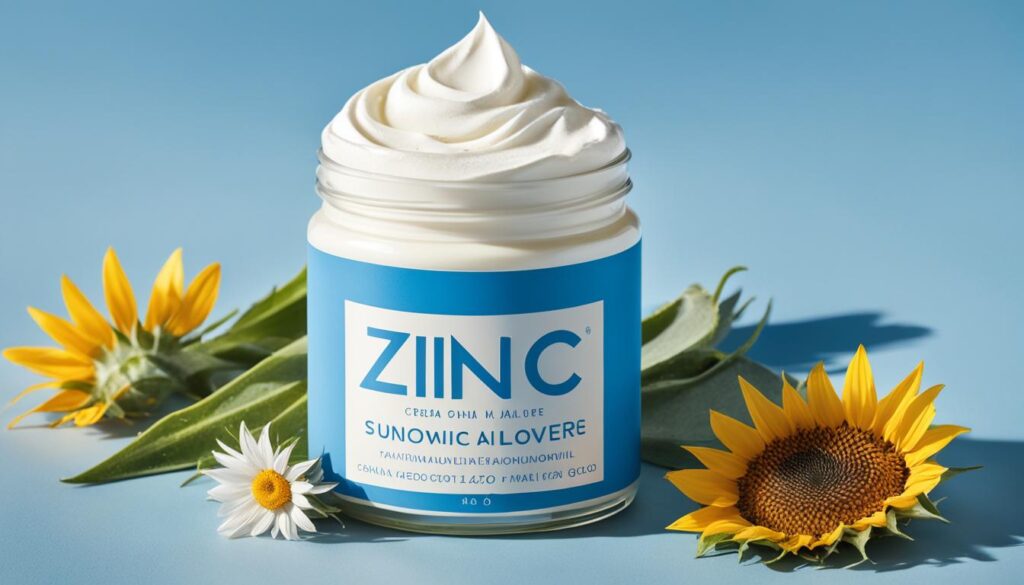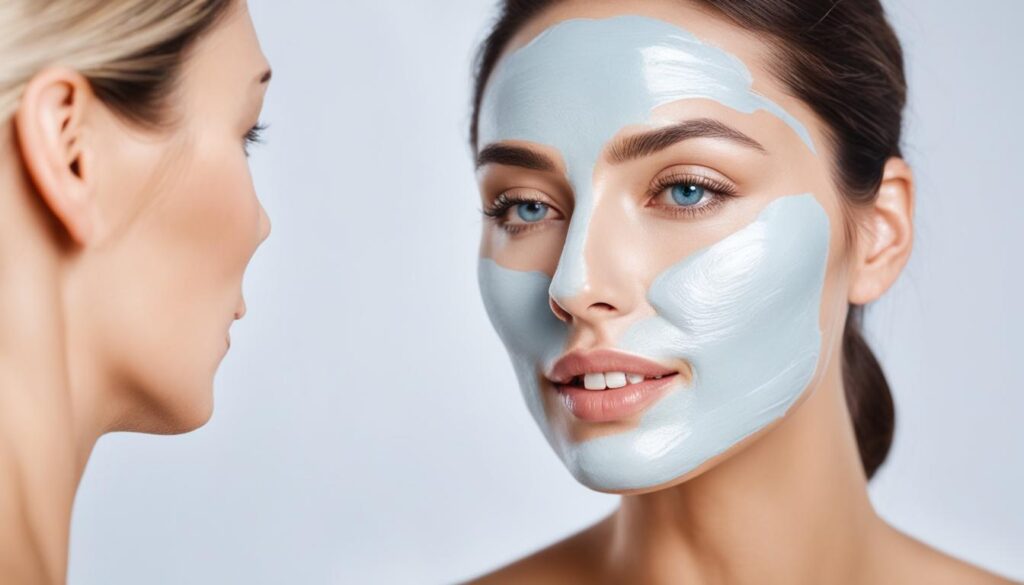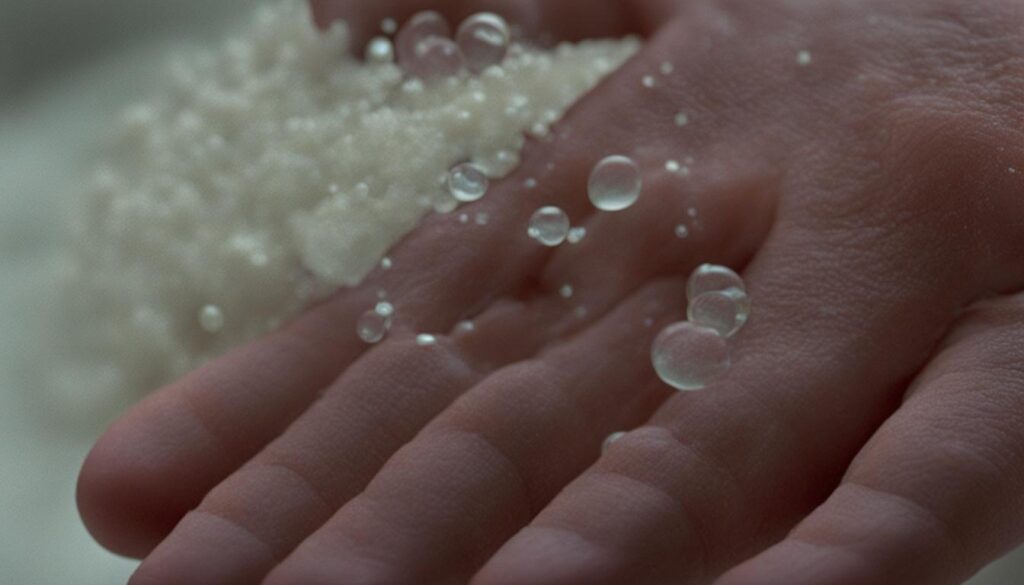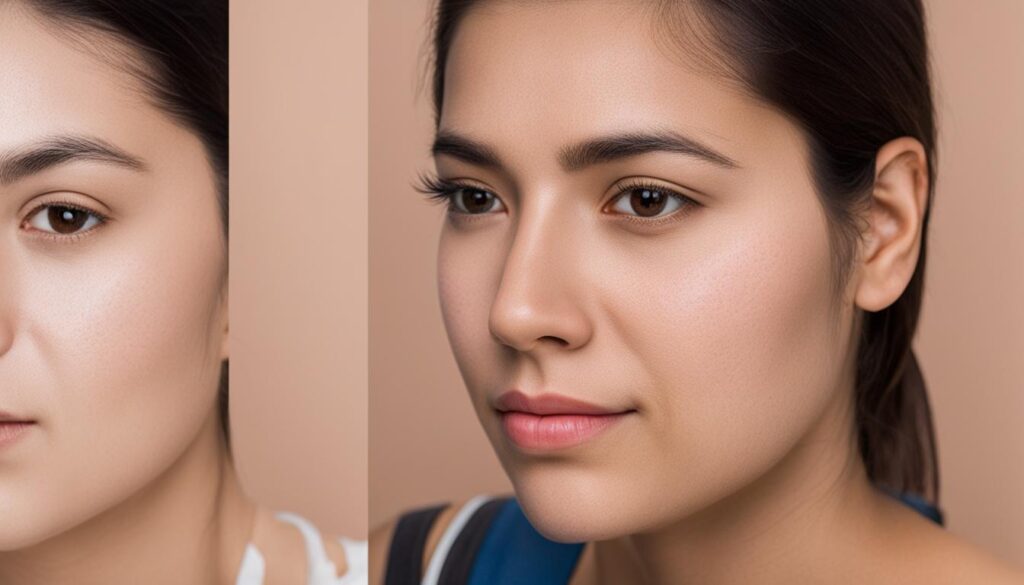Zinc oxide is a versatile ingredient that offers numerous benefits for skin health. It is a white powdery chemical or inorganic compound obtained from oxidizing zinc. It has been used for decades to treat various skin conditions, including inflammation, sun damage, and acne. Zinc oxide is commonly found in physical sunscreens, diaper rash creams, and calamine lotions. Its main benefits include protecting the skin from sun damage, improving the healing of wounds, controlling excess oil production, treating acne, and preventing bacterial infections.
Key Takeaways:
- Zinc oxide is a versatile ingredient with multiple benefits for skin health.
- It is commonly used in physical sunscreens, diaper rash creams, and calamine lotions.
- Zinc oxide protects the skin from sun damage and helps in wound healing.
- It controls excess oil production, making it beneficial for oily skin.
- Zinc oxide has antimicrobial properties, helping to prevent bacterial infections.
What Is Zinc Oxide?
Zinc oxide is a white powdery chemical or inorganic compound obtained from oxidizing zinc. It is commonly used in skincare products due to its numerous benefits for the skin. Zinc oxide has a long history of use as a strong sun protection ingredient and is also effective in treating various skin conditions.
Is Zinc Oxide Safe For Your Skin?

Zinc oxide is widely recognized as a safe ingredient for the skin. It is commonly used in cosmetics and over-the-counter skincare products due to its numerous benefits. However, it is always a good practice to perform a patch test before incorporating any new skincare product into your routine. This helps determine if you have any allergies or sensitivities to the product.
If you have pre-existing skin conditions or are unsure about using products containing zinc oxide, consulting a dermatologist or healthcare professional is recommended.
While zinc oxide is generally safe to use, it is essential to follow proper guidelines and use the product as directed. Avoid applying it to broken or irritated skin and keep it away from the eyes.
“Zinc oxide is widely recognized as a safe ingredient for the skin.”
By taking these precautions, you can confidently enjoy the benefits of zinc oxide while keeping your skin healthy and protected.
| Zinc Oxide Safety Tips |
|---|
| Perform a patch test before using |
| Avoid applying to broken or irritated skin |
| Keep away from the eyes |
| Consult a dermatologist if you have allergies or sensitivities |
What Are The Benefits Of Zinc Oxide For Skin?
Zinc oxide offers a range of benefits for the skin. With its natural sun protection properties, it can effectively shield the skin from both UVA and UVB rays, providing a crucial defense against harmful sun exposure. Its ability to improve the healing of wounds makes it a valuable ingredient in skincare products, helping to soothe and repair damaged skin.
In addition, zinc oxide controls excess oil production, making it particularly advantageous for those with oily skin. By regulating oil balance, it can reduce the risk of acne breakouts and promote a healthier complexion. This multifunctional ingredient also exhibits anti-inflammatory and antibacterial properties, making it effective in treating acne and preventing bacterial infections.
Overall, zinc oxide is a versatile and powerful asset for skincare. Its protective, healing, and oil-controlling properties make it a valuable addition to any skincare routine, contributing to healthier and more radiant skin.
How To Use Zinc Oxide On Face?

Using zinc oxide on your face is a simple and effective way to protect and nourish your skin. Whether it’s in the form of sunscreen, creams, or powders, zinc oxide offers a range of benefits for your skin health. Here are some tips on how to use zinc oxide on your face:
1. Sunscreen Protection
When using zinc oxide as a sunscreen, it’s important to apply it generously on your face and exposed skin. Make sure to apply it at least 30 minutes before stepping out in the sun to allow it to fully absorb into the skin. Remember to reapply every two hours, especially if you’re swimming or sweating.
2. Targeting Acne
If you’re dealing with acne, zinc oxide creams can be a great addition to your skincare routine. After washing and moisturizing your face, apply a thin layer of zinc oxide cream to the affected areas. Its anti-inflammatory properties can help reduce redness and inflammation associated with acne breakouts.
3. Healing Wounds
Zinc oxide can also be used to aid in wound healing. Applying it as an ointment directly on minor cuts, scrapes, or burns can promote faster healing and protect the skin. Its soothing properties help alleviate discomfort and reduce the risk of infection.
4. DIY Creams and Lotions
Zinc oxide powder can be incorporated into homemade creams and lotions for additional skincare benefits. Mix it with other natural ingredients, such as coconut oil or shea butter, to create a personalized skincare product. This allows you to tailor the formula to your specific needs and preferences.
I have found that using zinc oxide on my face has significantly improved the condition of my skin. Its sun protection properties keep my skin safe from harmful UV rays, while its ability to control excess oil production helps prevent acne breakouts. Additionally, zinc oxide helps heal wounds and reduces inflammation, leaving my skin healthy and rejuvenated.
Remember, every individual’s skin is unique, so it’s essential to patch test any new product containing zinc oxide. If you experience any allergic reactions or discomfort, discontinue use and consult a dermatologist.
Side Effects Of Zinc Oxide & Precautions
While zinc oxide is generally safe for use on the skin, it is important to be aware of potential side effects and take necessary precautions. Here are some important considerations:
Patch Test
Before using any product containing zinc oxide, it is advisable to perform a patch test. Apply a small amount of the product on a small area of your skin, such as the inside of your wrist, and monitor for any adverse reactions. This will help determine if you have any sensitivity or allergy to zinc oxide.
Avoid Broken or Blistered Skin
Zinc oxide should not be applied to broken or blistered skin. This is because open wounds or damaged skin can absorb the ingredient more readily, potentially leading to adverse effects or irritations.
Avoid Contact with Eyes
When using products containing zinc oxide, it is important to avoid contact with the eyes. If the product accidentally comes into contact with the eyes, rinse thoroughly with water and seek medical attention if any persistent discomfort or redness occurs.
Allergic Reactions
If you experience any allergic reactions such as skin rash, itching, swelling, or difficulty breathing after using zinc oxide, immediately discontinue use and seek medical help. These symptoms could indicate an allergic response that requires prompt attention.
Consult a Doctor
If you are pregnant, lactating, or have any preexisting allergies or skin conditions, it is important to consult a healthcare professional before using products containing zinc oxide. They can provide personalized advice based on your individual circumstances.
By taking these precautions, you can safely and effectively incorporate zinc oxide into your skincare routine, reaping its multitude of benefits for your skin’s health and protection.
Useful Tips About Zinc Oxide

When it comes to using zinc oxide, there are some useful tips that you should keep in mind:
- Do a patch test: Before using zinc oxide on your skin, it’s important to conduct a patch test to check for any potential allergic reactions. Apply a small amount of the product on a small area of your skin and wait for at least 24 hours to see if any irritation occurs.
- Avoid broken or blistered skin: Zinc oxide should not be applied to broken or blistered skin as it may cause further irritation or discomfort. Make sure your skin is intact and healthy before using any products containing zinc oxide.
- Combine with a moisturizer: If you have dry skin, consider using zinc oxide in combination with a moisturizer. This can help prevent dryness and keep your skin hydrated while benefiting from the protective properties of zinc oxide.
- Inform your doctor: If you are using any medications or have any underlying health conditions, it’s important to inform your doctor before incorporating zinc oxide into your skincare routine. They can provide personalized advice based on your specific situation.
- Avoid using internally: Zinc oxide should only be used externally on the skin. It is not intended for internal use. If you have any concerns about using zinc oxide, consult with a healthcare professional.
- Avoid contact with the eyes: When applying zinc oxide on your face, be careful to avoid contact with the eyes. If accidental contact occurs, rinse thoroughly with water.
- Wear a zinc oxide-rich sunscreen: For daily sun protection, opt for a sunscreen that contains zinc oxide. Look for a broad-spectrum sunscreen with a high concentration of zinc oxide to ensure effective protection against harmful UVA and UVB rays.
By following these useful tips, you can make the most of zinc oxide and its benefits for your skin.
Protects Skin From Sun Damage

Zinc oxide provides natural sun protection benefits, shielding the skin from the harmful effects of UVA and UVB rays. As a physical sunscreen ingredient, it reflects and absorbs these rays, preventing them from penetrating the skin and causing damage. Zinc oxide’s efficacy in sun protection depends on its concentration, with higher percentages offering longer-lasting protection.
When applied topically, zinc oxide forms a protective barrier that acts as a shield against the sun’s rays. It is especially effective in blocking UVA rays, which are responsible for premature aging and skin cancer. UVB rays, on the other hand, cause sunburns and can be equally damaging. Zinc oxide offers broad-spectrum protection, safeguarding the skin against both UVA and UVB rays.
To ensure adequate sun protection, it is essential to choose sunscreens that contain a sufficient concentration of zinc oxide. Typically, sunscreens include 25% to 30% zinc oxide to provide optimal protection while maintaining a pleasant texture on the skin. By incorporating zinc oxide into their daily skincare routine, individuals can significantly reduce the risk of sun damage and maintain healthier, more radiant skin.
Remember, protecting your skin from the sun’s harmful rays is crucial for maintaining skin health and preventing premature aging and skin cancer. Incorporating sunscreens with zinc oxide into your daily skincare regimen is a simple yet effective way to shield your skin from sun damage and maintain its youthful appearance.
Improves Healing Of Skin

Zinc oxide possesses natural healing properties that can effectively improve the healing of various skin conditions. This multifunctional ingredient is particularly beneficial for promoting wound healing, soothing sunburns, and reducing inflammation.
A deficiency in zinc has been linked to slower wound healing, making zinc oxide an essential addition to skincare routines. Its healing properties work from within the skin, aiding in the regeneration of damaged tissue and promoting faster healing.
When applied topically, zinc oxide soothes sunburned skin, providing relief from pain and tenderness. Its anti-inflammatory properties help calm the skin and reduce redness, helping it recover from sun damage more quickly.
According to research, zinc oxide plays a vital role in the healing process of the skin, making it an effective ingredient for improving wound healing, soothing sunburns, and reducing inflammation.
Why Zinc Oxide is Beneficial for Wound Healing
Zinc oxide offers several benefits that contribute to its efficacy in wound healing:
- Antibacterial properties: Zinc oxide helps protect wounds from bacterial infections, reducing the risk of complications during the healing process.
- Anti-inflammatory effects: By reducing inflammation, zinc oxide helps minimize swelling and pain, creating a more favorable environment for healing.
- Scar reduction: Zinc oxide has been found to help minimize scarring by supporting the formation of healthy skin tissue.
Overall, incorporating skincare products containing zinc oxide can significantly improve the healing of wounds, soothe sunburned skin, and alleviate inflammation, providing optimal support for a healthy and rejuvenated complexion.
“Zinc oxide possesses natural healing properties that can effectively improve the healing of various skin conditions.”
Controls Excess Oil

Zinc oxide has the remarkable ability to control excess oil production and maintain oil balance, making it a valuable ingredient for those with oily skin types. By reducing the formation of oil beneath the skin’s surface, zinc oxide helps to regulate sebum levels and minimize the risk of acne breakouts.
This natural astringent property of zinc oxide not only helps to keep the skin’s oil production in check but also promotes a smoother and more balanced complexion. Whether you’re dealing with a shiny T-zone or an overall oily complexion, incorporating skincare products or sunscreens containing zinc oxide can prove beneficial in controlling excess oil and managing the associated concerns.
With its skin-friendly formulation, zinc oxide provides a gentle yet effective solution for those seeking to achieve a refined and oil-balanced complexion, contributing to a healthier and more confident you.
| Benefits of Zinc Oxide for Excess Oil Control | How It Works |
|---|---|
| Regulates Sebum Production | Zinc oxide helps in balancing oil levels and preventing excessive sebum production. |
| Astringent Properties | Zinc oxide acts as a gentle astringent that tightens and refines the pores, reducing oiliness. |
| Reduces Breakouts | By controlling excess oil, zinc oxide decreases the likelihood of acne breakouts caused by clogged pores. |
| Improves Skin Texture | Regular use of zinc oxide can lead to a smoother, more refined complexion by managing oil levels. |
Treats Acne

Zinc oxide is a versatile ingredient with remarkable skincare properties. When it comes to fighting acne, zinc oxide is a beneficial treatment option. Its anti-inflammatory and antibacterial properties help reduce the severity and appearance of acne breakouts. Zinc oxide can be combined with other antibacterial agents to create a potent formula that targets acne-causing bacteria.
Research suggests that the topical application of zinc oxide, either alone or in combination with other elements, can effectively reduce the growth of P. acnes bacteria, a common cause of acne. By inhibiting bacterial proliferation, zinc oxide helps prevent the development of new blemishes and promotes clearer, healthier skin.
If you’re struggling with acne, incorporating zinc oxide into your skincare routine can be a valuable addition. Its anti-inflammatory effects help soothe redness and irritation, while its antibacterial properties combat the underlying factors that contribute to acne formation. When used consistently and as part of a comprehensive skincare regimen, zinc oxide can play a significant role in achieving a clearer complexion.
Key Points:
- Zinc oxide has anti-inflammatory properties that help reduce the severity of acne breakouts.
- It possesses antibacterial properties that target and minimize the growth of P. acnes bacteria.
- Research suggests that topical use of zinc oxide can effectively treat acne.
- Consistent use of zinc oxide as part of a skincare routine can contribute to achieving a clearer complexion.
By incorporating products containing zinc oxide into your daily skincare routine, you can harness its therapeutic benefits to effectively treat acne and promote healthier, blemish-free skin.
Illustration: Zinc oxide’s anti-inflammatory and antibacterial properties make it an effective treatment for acne.
Prevents Bacterial Infection
Zinc oxide, with its antimicrobial properties, plays a crucial role in preventing bacterial infections. Its ability to inhibit the growth of bacteria makes it an effective ingredient for maintaining skin health. By aiding tissue repair and promoting wound healing, zinc oxide helps reduce the risk of bacterial adhesion and fights inflammation.
Studies have shown that zinc oxide can decrease the likelihood of developing a bacterial infection by preventing the internalization of bacteria into the skin. Its antimicrobial properties make it a valuable component in skincare products, as it provides an added layer of protection against harmful bacteria.
In addition to its antimicrobial benefits, zinc oxide also contributes to wound healing. By supporting the natural healing process of the skin, it helps in the regeneration of healthy tissues and assists in the closing of wounds. This makes zinc oxide an essential ingredient to consider in treatments for various skin conditions.
Overall, zinc oxide serves as a preventive measure against bacterial infections by acting as an antimicrobial agent. Its contribution to wound healing and its ability to combat bacterial adhesion make it a valuable addition to skincare routines, ensuring optimal skin health.
FAQ
What are the benefits of using zinc oxide for skin?
Zinc oxide offers a range of benefits for the skin, including protecting it from sun damage, improving the healing of wounds, controlling excess oil production, treating acne, and preventing bacterial infections.
What is zinc oxide and how is it obtained?
Zinc oxide is a white powdery chemical or inorganic compound obtained from oxidizing zinc.
Is zinc oxide safe for the skin?
Zinc oxide is generally considered safe for the skin and is widely used in cosmetics and over-the-counter skincare products. However, a patch test is recommended before using it, especially if you have allergies or skin conditions. Consult a doctor if needed.
How can zinc oxide be used on the face?
Zinc oxide can be used on the face in various forms, such as in sunscreens, moisturizers, and makeup products. It can be applied before sun exposure as a sunscreen, as a cream to acne spots, as an ointment for wound healing, or as a powder for homemade creams and lotions.
What are the side effects of zinc oxide and what precautions should be taken?
Zinc oxide generally does not cause severe side effects. However, a patch test is recommended before use, and it should not be applied to broken or blistered skin. Contact with the eyes should be avoided. Medical help should be sought if allergic reactions occur. Consult a doctor if pregnant, lactating, or have existing allergies or skin conditions.
Do you have any useful tips about using zinc oxide?
Yes, here are some useful tips: do a patch test before using it, avoid using on broken or blistered skin, use it in combination with a moisturizer for dry skin, inform your doctor about any medications you are using, avoid using it as an internal medicine, avoid contact with the eyes, and wear a zinc oxide-rich sunscreen daily for sun protection.
How does zinc oxide protect the skin from sun damage?
Zinc oxide has natural sun protection benefits and can protect the skin from UVA and UVB rays. It reflects and absorbs the harmful rays, preventing them from entering the skin. The efficacy of zinc oxide in sun protection depends on its concentration.
Does zinc oxide help improve the healing of skin?
Yes, zinc oxide has natural healing properties and can improve the healing of wounds. It is beneficial for conditions like sunburn and tenderness. It helps heal the skin from within and soothes it, promoting faster healing.
Can zinc oxide control excess oil on the skin?
Yes, zinc oxide works as an astringent and helps control excess oil production. It reduces oil formation beneath the skin, thereby maintaining oil balance and decreasing the risk of acne breakouts. It is especially beneficial for those with oily skin types.
Is zinc oxide effective in treating acne?
Yes, zinc oxide has anti-inflammatory properties and is effective in treating acne. It can be blended with other antibacterial agents to minimize the severity and appearance of acne breakouts. It reduces the growth of P. acnes bacteria, a common cause of acne.
Does zinc oxide have antimicrobial properties?
Yes, zinc oxide is antimicrobial and prevents bacterial infections. It aids in tissue repair, wound healing, and fights inflammation, reducing the risk of bacterial adhesion. It is a beneficial ingredient for preventing bacterial infections on the skin.






